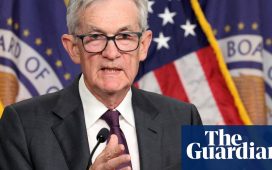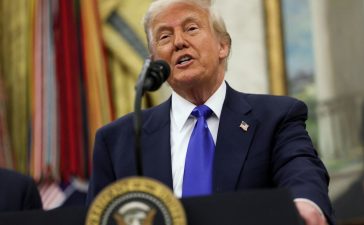In a column for the Atlantic almost eight years ago, the reporter Salena Zito said “the press takes [Trump] literally, but not seriously; his supporters take him seriously, but not literally”.
It was a wonderfully astute distinction for the pre-2016 election period.
But her characterisation turned out to be false. In office we learnt to take Trump sometimes seriously, sometimes literally, sometimes neither and sometimes both. In short, everyone had to engage their critical faculties on different issues rather than rely on her original observation.
So, what should we make of the remarks on inflation and the Federal Reserve made last week by the two candidates to become US president, Kamala Harris and Donald Trump?
Take Harris seriously, not literally
There is no doubt that Kamala Harris feels the need to talk about inflation. Over the past week, her stump speeches in Pennsylvania, Wisconsin, Michigan, Arizona and Nevada have all contained some version of the following remarks (these are from Michigan).
We believe in a future where we lower the cost of living for America’s families so they have a chance not just to get by but to get ahead. Because, look, while our economy is doing well by many measures, prices for everyday things like groceries are still too high. You know it and I know it.
When I was attorney-general, I went after price-fixing schemes. And when I am president, it will be my day one priority to fight to bring down prices; to take on the big corporations that engage in illegal price gouging; take on corporate landlords that unfairly raise rents on working families; to take on Big Pharma and cap the cost of prescription drugs for all Americans. That is the work we will do together.”
Notice there is no talk about disinflation, but an ambition to bring down prices and some specific areas where Harris would like to act. Taken literally, this is a call for the Fed and other parts of government to lower the price level and seek deflation. If this were literally true, the only valid response would be, “you cannot be serious”.
Fortunately, there is an excellent source available to allow us a clear interpretation of the thinking behind Harris’s words. In fact Jared Bernstein, chair of President Joe Biden’s Council of Economic Advisers, wrote it down late last month.
After an eloquent and pretty standard explanation of the causes of inflation, Bernstein noted something I’ve also been banging on about.
Economists obsess over rates; regular people obsess over levels . . . A central banker wants inflation to get back to target. A shopper wants his or her old price back.”
Now, Bernstein and, I presume, Harris do not explicitly want deflation but recognise that people have powerful rules of thumb about how much things should cost.
So long as inflation is low, these can adjust slowly without a problem. But when inflation is high, Bernstein said a lot more of these rules of thumb are broken and “vibe disruption ensues”. This might take two years to heal, he added. For example, he noted the increase and subsequent recovery in the number of hours it would take typical production workers to earn enough for a week of groceries (below).
The most important passage of his for understanding Harris’s words is the following:
Vibes matter, and economists risk talking past people if we fail to recognise that both inflation rates AND price levels matter. We’re acutely aware of this in the Biden/Harris administration and it is a key reason for our cost-cutting agenda.”
Harris is calling for price and cost-cutting measures not because she believes in deflation, but sees these actions, which would involve relative price changes, as essential to help people reset their price level rules of thumb and slowly accept they are no worse off after the period of inflation.
The upshot: Take Harris seriously, but not literally. And read the whole Bernstein speech. It explains everything.
Harris on the Fed
Harris has also taken some questions spontaneously from journalists. After her rally in Phoenix, Arizona on Saturday, she promised a big economy speech this week and reiterated her support for Fed independence. I think we can take the following seriously and literally (1m25s in this video).
The Fed is an independent entity and, as president, I would never interfere in the decisions that the Fed makes.”
Don’t take Trump’s word for it
If Harris’s stump speech words were extremely carefully chosen and required an economics lecture to explain them, Trump’s comments on inflation and the Fed were improvised and can be summarised by the phrase “I’m the best”. He made this clear in Thursday’s news conference (72 mins in).
The Federal Reserve is a very interesting thing and it’s sort of gotten it wrong a lot and [Powell’s] tending to be a little bit late on things. He gets a little bit too early and a little bit too late and, you know, that’s very largely a gut feeling, I believe it’s really a gut feeling and I used to have it out with him. I had it out with him a couple of times very strongly.
I fought him very hard and, you know, we get along fine, we get along fine, but I feel that a president should have at least say in there, yeah, I feel that strongly I think that in my case I made a lot of money. I was very successful and I think I have a better instinct than in many cases people that would be on the Federal Reserve or the chair.”
I am sure no one should take this literally. I do not think we should take it entirely seriously either and certainly not write that Trump is stirring fears for Fed independence as the Wall Street Journal did. That said, there will be a lot of uncertainty at the Fed if Trump wins. I can also report that yesterday’s chat with Elon Musk on X added little.
Although Trump’s words on the Fed above were a rambling mess, it is important not to dismiss the former president. He also understands that levels matter more than rates for salience such as when he says “you have people dying financially because they can’t buy bacon” (59 mins in). This will be difficult for Harris even if Trump’s estimation of current gasoline and bacon prices are simply a lie.
People are voting with their stomachs, meaning they’re going to the grocery store they’re paying 50, 60, 70 per cent more for food than they did just a couple of years ago.
Look at what’s happened to energy; look at what’s happened not only to their cars where gasoline’s gone from $1.87, we had moments when it was below that, but it’s gone from $1.87 to five, six and seven dollars.”
With Musk, Trump was also talking about those hurt by inflation and again revealed his weird interest in bacon prices.
We’ve got to get the prices down you know, when I look at bacon costing five four or five times more than it did a few years ago, when when you look at some of the food products and groceries people go they can’t believe it, they used to be able to buy a whole cart and today you know a lot of people just don’t have the money, they go in and they can’t buy anything they they look at, yeah it’s sticker shock they call it sticker shock.”
The chart below shows the true rise in the level of US prices (CPI), gasoline and bacon. Memo to Donald Trump: Stop talking about bacon — you’re out of date on the cured meat front.
What I’ve been reading and watching
-
Barry Eichengreen, professor of economics at the University of California, Berkeley, wrote an opinion article telling the stock market to calm down and not overreact to recent data. He expects the Fed will not be swayed from previous guidance
-
Soumaya Keynes was talking to Catherine Mann, an external member of the Bank of England’s Monetary Policy Committee, late last week for her Economics Show podcast. Mann is still worried that real wage resistance will keep inflation too high in the UK for too long
-
Ahead of Kamala Harris’s economic policy roll out this week, I looked at the Biden record on the economy versus Donald Trump. Inflation will be a big hurdle to clear and Harris might be wise not to build a campaign on Biden’s economic record
-
Unhedged asked what changed in the US economy last week. It concluded that higher volatility puts the Fed in a difficult position — either the market forces it to cut more than it wants, or it refuses and the markets have a tantrum
-
If you want the full two hours of Trump, here is the YouTube link. If, like me, you want to search for a specific topic, I use TacTiq to generate a transcript.
A chart that matters
Forward interest rate markets did not get the message from the stock market that the initial panicked reaction to weaker-than-expected US jobs data was overblown. Traders expect the Fed to cut interest rates by 1 percentage point by the end of the year and follow that up with another 1 percentage point reduction in 2025.
For a relatively normal miss on jobs and unemployment, these are punchy bets. They assume that the Fed now sees the economy completely differently to a month ago.









